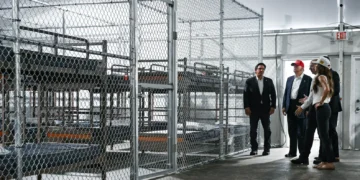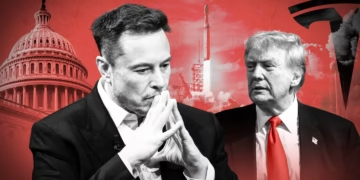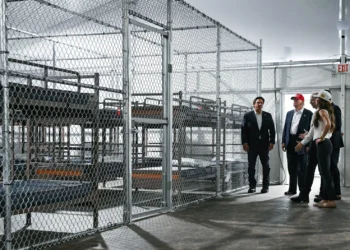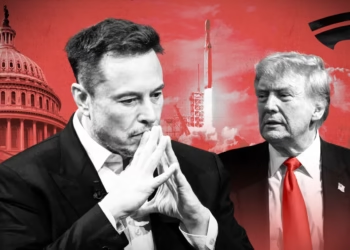In a remarkable turn of events, Friedrich Merz was elected as Germany’s chancellor after initially facing a historic defeat in the first round of voting.
Despite the initial setback, Merz managed to secure 325 votes in the second ballot, paving his way to the chancellorship.

This unexpected rise to power has garnered significant attention, with many questioning the factors that contributed to his comeback.
The story of Merz’s ascension is a testament to his resilience and determination.
Key Takeaways
- Friedrich Merz was elected chancellor after an initial defeat.
- He secured 325 votes in the second ballot.
- Merz’s rise to power was unexpected and garnered significant attention.
- His story is a testament to resilience and determination.
- The factors contributing to his comeback are worth examining.
The Unprecedented Political Upheaval in Germany
The recent downfall of Olaf Scholz’s government has triggered an unprecedented political upheaval in Germany. The collapse of the coalition government has created a power vacuum, paving the way for a new leader to take the helm.
The Fall of Scholz’s Coalition Government
Olaf Scholz’s three-party coalition government collapsed due to internal conflicts and policy disagreements. The German coalition government was unable to withstand the pressures of its internal divisions, leading to its downfall.
The collapse was triggered by a combination of factors, including economic policy disputes and disagreements over immigration. This instability has led to a period of political uncertainty in Germany.
Setting the Stage for a New Chancellor
The power vacuum created by the collapse of Scholz’s government has set the stage for a new chancellor to emerge. Friedrich Merz, a prominent figure in German politics, has positioned himself as a strong contender for the chancellorship.
The Merz vs Scholz dynamic has become a significant aspect of the current political landscape, with Merz emerging as a potential leader to succeed Scholz. As Germany navigates this period of political upheaval, the prospect of a new chancellor, potentially Friedrich Merz, becoming the Germany new chancellor is gaining traction.

Who is Friedrich Merz? A Political Profile
Friedrich Merz’s rise to the chancellorship is a testament to his enduring influence within the CDU. To understand his ascent, it’s essential to examine his background and political trajectory.
Early Life and Political Beginnings
Friedrich Merz was born on November 11, 1955, in Brilon, Germany. He studied law and began his political career in the late 1970s, joining the CDU. Merz’s early involvement in politics was marked by his commitment to conservative values and his rise through the party ranks.
Corporate Career and Hiatus from Politics
After serving in various political roles, Merz took a hiatus from politics to pursue a career in the corporate sector. He worked as a lawyer and later became involved in several corporate boards. This period away from politics allowed Merz to gain valuable experience and build a network of professional contacts.
Return to the Political Arena
Merz returned to politics in the early 2000s, rejoining the CDU and quickly regaining prominence. He became known for his leadership skills and his ability to navigate complex political landscapes. Merz’s return was marked by his appointment to key roles within the party, ultimately leading to his current position as Chancellor.
| Year | Event | Position/Role |
|---|---|---|
| 1955 | Born in Brilon, Germany | – |
| Late 1970s | Joined CDU, began political career | Member of CDU |
| Early 2000s | Returned to politics | Key roles within CDU |
| Recent | Elected Chancellor of Germany | Chancellor |
Friedrich Merz’s journey to the chancellorship is a story of perseverance and strategic maneuvering within the CDU. His leadership has been pivotal in shaping the party’s direction and Germany’s political landscape.
The Historic First-Round Defeat in Parliament
In a surprising turn of events, Friedrich Merz suffered a historic defeat in the first round of voting in parliament. This unexpected outcome was a significant setback in his bid to become Germany’s Chancellor.
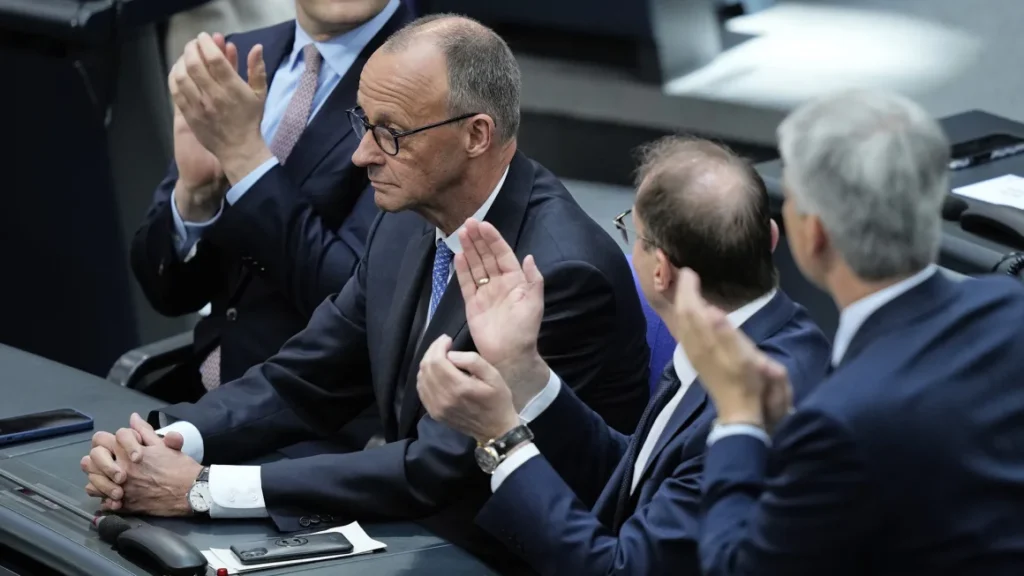
German Chancellor Election Process
The German Chancellor is elected by the Bundestag, the lower house of the German parliament. The election process involves a vote of confidence, where the candidate needs to secure a majority of the votes cast. The process is typically straightforward when there’s a clear majority; however, in cases where there’s a hung parliament, negotiations and multiple rounds of voting can occur.
The Shocking Result of the First Vote
During the first round of voting, Friedrich Merz won 310 votes, falling short of the 316 required to secure a majority. This result was shocking given Merz’s stature within his party and the expectations leading up to the vote.

Immediate Aftermath and Political Reactions
The immediate reaction to Merz’s defeat was one of surprise and concern among his supporters. Political analysts quickly pointed out that this defeat could either be a temporary setback or a significant indicator of deeper political divisions within Germany.
| Party | Votes | Percentage |
|---|---|---|
| CDU/CSU | 310 | 49.1% |
| Opposition | 206 | 32.6% |
| Abstentions | 116 | 18.3% |
The table above illustrates the voting pattern during the first round, highlighting the close margin between Merz’s vote count and the required majority.
Friedrich Merz Merz Germany Chancellor: The Unexpected Turnaround
Friedrich Merz’s election as Germany’s chancellor was a result of intense behind-the-scenes negotiations following his initial defeat. This dramatic turn of events was not just a product of chance but a result of strategic alliances and compromises.
Behind-the-Scenes Negotiations After the Defeat
After the first-round defeat, Merz and his team engaged in intensive negotiations with potential coalition partners. These talks were crucial in understanding the political landscape and identifying areas of common ground.
The negotiations were not without their challenges. Merz had to navigate through complex party dynamics, making strategic compromises to garner support.
Strategic Alliances and Compromises
Merz formed key alliances with other political parties, which were pivotal in securing his position. These alliances were built on mutual interests and a shared vision for Germany’s future.
The compromises made during this period were significant, as Merz had to balance his political ideology with the demands of his coalition partners.
The Successful Second Vote
In the second vote, Merz received 325 votes, securing his position as chancellor. This outcome was a testament to the effectiveness of his negotiation strategies and the support he garnered from his allies.
Merz’s victory in the second ballot marked a significant turnaround in his political fortunes, transforming an initial defeat into a resounding success.


The CDU’s Path to Power Under Merz’s Leadership
After Angela Merkel’s era, the CDU found a new direction under Merz’s guidance. The party’s journey to power was not straightforward, but with strategic leadership, it managed to secure a significant victory in the 2025 election.
Rebuilding the Party After the Merkel Era
The CDU, after being led by Angela Merkel for over a decade, needed a fresh perspective. Merz’s leadership brought about a much-needed change, focusing on rejuvenating the party’s image and policies to appeal to a new generation of voters.
The rebuilding process involved revisiting the party’s core values and integrating new ideas that resonated with the contemporary political landscape. This strategic shift helped in regaining the trust of the electorate.
Campaign Strategies in the 2025 Election
The CDU’s campaign strategy for the 2025 election was multifaceted, focusing on key areas such as economic growth, social welfare, and environmental sustainability. Merz’s vision for a progressive yet stable Germany resonated with many voters.
- Emphasis on digital infrastructure
- Support for small and medium-sized enterprises
- Commitment to reducing carbon footprint
Key Political Messaging and Voter Appeal
The CDU’s political messaging under Merz was centered around unity, progress, and stability. The party effectively communicated its plans for Germany’s future, appealing to a broad spectrum of voters.
| Key Messaging | Voter Appeal |
|---|---|
| Economic Stability | Confidence in financial security |
| Social Welfare | Support for families and individuals |
| Environmental Policies | Commitment to a sustainable future |
The CDU/CSU conservatives won 28.5% of the vote in the federal election in February, marking a significant achievement under Merz’s leadership.
Forming the New German Coalition Government
The formation of the new German coalition government under Friedrich Merz marked a significant shift in the country’s political landscape. After a period of intense political maneuvering, Merz successfully negotiated with potential partners to form a stable government.
Key Coalition Partners and Party Dynamics
Merz struck a coalition deal with the Social Democrats (SPD), a move that was seen as a strategic necessity given the political landscape. The SPD, having previously been part of the government under Scholz, brought significant experience and a strong voter base to the coalition.
“This coalition is not just about numbers; it’s about shared values and a common vision for Germany’s future,” Merz said, highlighting the importance of ideological alignment between the coalition partners.
The dynamics between the CDU, led by Merz, and the SPD were crucial. Both parties had to navigate their differences and find common ground on key policy issues.
Policy Compromises and Agreements
The coalition agreement included several key policy compromises. On economic policy, the CDU and SPD agreed on measures to boost German industry while investing in social welfare programs. Environmental policies were another area of focus, with both parties committing to ambitious climate targets.
One of the significant agreements was on energy policy, where the coalition partners decided to accelerate the transition to renewable energy sources. This move was seen as a crucial step in reducing Germany’s carbon footprint.
Key areas of policy agreement included:
- Economic stimulus packages
- Enhanced social welfare benefits
- Climate action plans
Cabinet Formation and Key Appointments
The cabinet formation was a critical step in consolidating Merz’s government. Key appointments were made to reflect the balance of power within the coalition. SPD leaders were given significant portfolios, ensuring that the coalition remained stable and effective.
Merz’s leadership style and his ability to negotiate with coalition partners were widely praised. “Merz has shown remarkable political acumen in forming this coalition,” said a political analyst.
Merz’s Economic and Political Vision for Germany
Germany’s political landscape is undergoing a significant change with Friedrich Merz’s vision for economic reform and global engagement. As the new Chancellor, Merz is expected to implement a comprehensive agenda that addresses both domestic and international challenges.
Domestic Policy Priorities
Merz’s domestic policy priorities are centered around revitalizing Germany’s economy. This includes:
- Economic Reform Agenda: Merz plans to introduce reforms aimed at stimulating economic growth, improving the business environment, and enhancing competitiveness.
- Social Policy Approach: His social policy approach focuses on ensuring that the benefits of economic growth are equitably distributed, with a particular emphasis on education, healthcare, and social welfare.


Foreign Policy Direction
On the foreign policy front, Merz is expected to strengthen Germany’s position within the European Union and enhance transatlantic partnerships.
- European Union Relations: Merz aims to foster stronger economic and political ties with EU member states, promoting a unified European approach to common challenges.
- Transatlantic Partnerships: He also plans to reinforce Germany’s relationship with the United States, focusing on trade, security, and climate change mitigation.
Energy and Climate Policies
Merz’s energy and climate policies are likely to focus on accelerating Germany’s transition to renewable energy sources, improving energy efficiency, and meeting climate targets. Key measures include:
- Investing in renewable energy technologies
- Promoting sustainable practices across industries
- Enhancing international cooperation on climate change
By adopting a comprehensive and forward-looking approach, Merz’s government aims to position Germany as a leader in both economic stability and environmental sustainability.
International and Domestic Reactions to Merz’s Chancellorship
Friedrich Merz’s ascension to the chancellorship has elicited a mix of reactions from international partners and domestic stakeholders. As Germany’s political landscape continues to evolve, understanding these reactions is crucial.
European Union Perspectives
The European Union has taken note of Merz’s appointment, with leaders expressing a mix of cautious optimism and concern. EU Commission President Ursula von der Leyen emphasized the importance of continued cooperation on key issues like climate change and economic stability. “We look forward to working closely with Chancellor Merz to address the pressing challenges facing Europe,” she stated.
U.S.-German Relations Under Merz
Across the Atlantic, the U.S. has been watching Merz’s rise with interest.
“We congratulate Chancellor Merz on his appointment and look forward to strengthening our bilateral relationship,”
a spokesperson for the U.S. State Department said. The implications of Merz’s chancellorship on U.S.-German relations remain to be seen, particularly in areas like defense and trade.
Public Opinion Within Germany
Within Germany, public opinion is divided. While some view Merz’s appointment as a positive step towards political stability, others are more skeptical. A recent poll indicated that 45% of Germans approve of Merz’s leadership, while 35% remain opposed.
Business and Market Responses
The business community has reacted positively to Merz’s economic policies, with many seeing his appointment as a signal of potential economic reform. Market analysts predict a boost in investor confidence, potentially leading to increased economic activity.
Conclusion: What Merz’s Rise Means for Germany’s Future
Friedrich Merz’s ascension to the role of Germany’s chancellor marks a significant shift in the country’s political landscape. As Germany’s new chancellor, Merz is poised to implement policies that could have far-reaching implications for the nation’s economy, politics, and international relations.
The impact of Merz’s chancellorship on Germany’s future is multifaceted. His leadership style and policy decisions will likely influence the country’s stance on key issues such as energy, climate change, and European integration. What does Merz’s chancellorship mean for Germany? It signifies a potential turning point in the country’s political trajectory, with possible ripple effects across the European Union.
As Merz navigates the complexities of his new role, his ability to form effective coalitions and drive policy reforms will be closely watched by both domestic and international observers. Germany’s new chancellor faces significant challenges, but his leadership could also present opportunities for growth and renewal.
FAQ
Who is Friedrich Merz and how did he become Germany’s chancellor?
Friedrich Merz is a German politician who became chancellor after a historic defeat in the first round vote. He rose to power through his leadership of the CDU and strategic alliances formed after his initial defeat.
What led to the collapse of Scholz’s coalition government?
The collapse of Scholz’s coalition government was due to various factors, including internal conflicts and policy disagreements, creating an opportunity for Friedrich Merz to become chancellor.
What are Merz’s domestic policy priorities?
Merz’s domestic policy priorities include economic reform and social policy, aiming to address Germany’s economic challenges and improve the welfare of its citizens.
How did Merz’s CDU win the 2025 election?
The CDU, under Merz’s leadership, employed effective campaign strategies and key political messaging that appealed to voters, helping the party secure a victory in the 2025 election.
What are the key components of Merz’s foreign policy direction?
Merz’s foreign policy direction includes maintaining strong relations with the EU and fostering transatlantic partnerships, aiming to secure Germany’s position on the global stage.
How has the international community reacted to Merz’s chancellorship?
The international community, including the European Union and the U.S., has reacted to Merz’s chancellorship with a mix of interest and caution, awaiting the implications of his policies.
What are the implications of Merz’s rise to power for Germany’s economy?
Merz’s rise to power is expected to have significant implications for Germany’s economy, particularly through his economic reform policies, which aim to address current challenges and stimulate growth.
What does Merz’s chancellorship mean for Germany’s future?
Merz’s chancellorship is likely to shape Germany’s future in various ways, including its economy, politics, and international relations, as he implements his vision and policies.
How did Merz recover from his historic first-round defeat?
Merz recovered from his initial defeat through behind-the-scenes negotiations and strategic alliances, ultimately securing the necessary support for his election as chancellor in the second vote.
What are the key coalition partners in Merz’s government?
The key coalition partners in Merz’s government were determined through negotiations after the 2025 election, involving parties that aligned with the CDU’s policies and goals.








